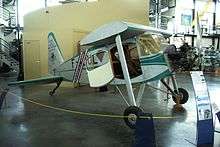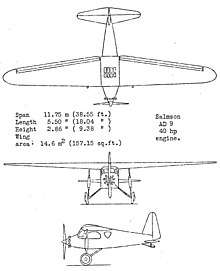Peyret-Mauboussin PM XI
The Peyret-Mauboussin PM XI was a French high-wing touring aircraft of the early 1930s.

| Peyret-Mauboussin PM XI | |
|---|---|
 | |
| Peyret-Mauboussin PM XI No.02 at Mitry-Mory airfield near Paris in May 1957. This aircraft flew Paris-Tananarive in December 1931 | |
| Role | two-seat touring aircraft |
| National origin | France |
| Manufacturer | Peyret-Mauboussin |
| Designer | Louis Peyret and Pierre Mauboussin |
| First flight | 9 July 1930 |
| Status | one preserved by a museum |
| Primary user | private flyers |
| Number built | 2 |
| Developed from | Peyret-Mauboussin PM X |
Development
The PM XI was designed by Peyret-Mauboussin as a Salmson-engined two-seat touring and sporting aircraft of wooden construction, an enlarged and more powerful development of the single-seat Peyret-Mauboussin PM X.[1] Two examples were built.[2]
Operational history
Two PM.XIs were built in parallel.[2] The airframe c/n 02 was finished first and first flew on 9 July 1930. It was registered as F-AJUL. c/n 01 F-AKFD was ordered by the French Service Technique.[3]
In July F-AJUL took part in the Challenge International de Tourisme 1930 touring aircraft contest, piloted by Charles Fauvel,[4] but damaged a landing gear in a compulsory landing.[5] By November one was flying at their Orly base and the other was under test for its CoA at Villacoublay.[2] F-AJUL was later flown by Rene Lefevre from Paris to Tananarive, Madagascar, between 1 and 14 December 1931. The total distance flown was 11,000 km at an average speed of 120 km/hour. He also flew it, after fitting extra tankage in the cabin, from Paris to Saigon in 10 days during December 1932, a distance of 10,500 km (6,500 mi). The return trip in February 1933 took 8 days.[3]
This aircraft is stored without wings at the Musee Castel-Mauboussin at Cuers-Pierrefeu airfield near Toulon in southern France, and can be viewed by prior permission.[6]
Specifications

Data from NACA report (1931)[1]
General characteristics
- Crew: Two
- Length: 5.50 m (18 ft 1 in)
- Wingspan: 11.75 m (38 ft 7 in)
- Height: 2.86 m (9 ft 5 in)
- Wing area: 14.6 m2 (157 sq ft)
- Empty weight: 320 kg (705 lb)
- Gross weight: 515 kg (1,135 lb)
- Powerplant: 1 × Salmson 9 Ad 9-cylinder radial, 30 kW (40 hp)
- Maximum speed: 155 km/h (96 mph, 84 kn) at ground level
- Cruise speed: 135 km/h (84 mph, 73 kn)
- Range: 500 km (310 mi, 270 nmi)
- Service ceiling: 4,500 m (14,800 ft)
- Landing speed: 65 km/h (40 mph)
References
- Notes
- NACA report
- Les Ailes November 1930
- "The Mauboussin Corsaire". Air Britain Archive: 2010/150–151. December 2010.
- Les Ailes July 1930
- (in Polish) Krzyżan, Marian. Międzynarodowe turnieje lotnicze 1929-1934 [International aviation competitions 1929-1934], Warsaw 1988, ISBN 83-206-0637-3, p.180
- Ogden, 2006, p. 166
- Bibliography
- Aircraft circulars Of the National Advisory Committee for Aeronautics no.145 The Mauboussin M11 touring airplane (PDF). Washington: NACA. 1931.
- Ogden, Bob (2006). Aviation Museums and Collections of Mainland Europe. Air-Britain (Historians) Ltd. ISBN 0-85130-375-7.
- "Le Mauboussin biplace de 40CV". Les Ailes (492): 8. 20 November 1930.
- "Les débuts de Circuit d'Europe". Les Ailes (475): 9. 24 July 1930.
- The Mauboussin M.11 Monoplane in Flight, January 15, 1932, p. 48